Drone threat looms as Europe's leaders head for Copenhagen summit
With more than 40 heads of state arriving this week, Denmark is turning to a Swedish anti-drone system and a German frigate to keep its airport safe

COPENHAGEN – Ensuring the two-kilometre runway at Copenhagen Airport remains safe has suddenly become a European security priority as Denmark prepares to host EU and European Political Community leaders this week amid a spate of drone incursions.
On Wednesday, EU heads of state and government will gather in Copenhagen for an informal European Council, followed the next day with leaders from the wider European Political Community – the EU’s concentric circle of neighbouring countries.
Yet in the past week, Denmark has faced repeated drone sightings over critical infrastructure.
The first incident came last Monday, when large drones with flashing lights were spotted above Kastrup Airport, disrupting flights and stranding thousands of passengers. On Wednesday evening, drones reappeared across the Jutland peninsula – including above Fighter Wing Skrydstrup, home to Denmark’s F-16 and F-35 fleet. More sightings over the weekend followed near the German border and at Denmark’s largest military facility.
Authorities acknowledged they could have shot down the drones above Kastrup but refrained, citing risks to civilians. “Whatever goes up must come down,” defence chief Michael Wiggers Hyldgaard said.
Last week, Polish defence forces accidentally put a house ablaze when trying to down a Russian drone, Polish media Rzeczpospolita reported.
Hybrid war
In a televised address on Thursday, Prime Minister Mette Frederiksen declared that Denmark is now facing “hybrid war,” naming Russia as the only actor with both the capacity and intent to mount such provocations.
Peter Viggo Jakobsen, associate professor at the Royal Danish Defence College, agreed. “There aren’t many other possible suspects, because who else has both the capacity and the desire to do it?” he told Euractiv.
The incidents have triggered debate in Denmark about whether the country is adequately prepared for Russian threats. Denmark has provided more military aid to Ukraine than any other country relative to GDP, making it a likely target for Kremlin pressure.
In Brussels, EU Defence Commissioner Andrius Kubilius said last week the bloc is working on a “drone wall” to protect its eastern flank – but admitted it could take a year to deploy. That offers little reassurance for Copenhagen ahead of this week’s high-level gatherings.
EXCLUSIVE: EU defence chief says ‘drone wall’ could be ready in a year
The EU could significantly improve its drone detection capabilities within a year but it will…
3 minutes

Kastrup Airport admitted they had to rely on visual contact – essentially, eyes and binoculars – to spot the drones. Only when the devices flew above the airport grounds on Monday, did they sound the alarm – and by then it was too late.
Over the past week, Danish police have been flooded with reports of drone sightings – most of which turned out to be legal civilian drones. “It is best not to call the police every time you see a light in the sky,” Police Inspector Paw Kaltoft told DR on Friday. By Sunday, authorities imposed a one-week ban on civilian drone use.
“We have been accustomed to hobby drones being the problem. EU summits are a much bigger deal,” Jakobsen said, noting that the presence of EU leaders dramatically raises the stakes.
“If you start sabotaging an EU summit, you risk having the entire EU on your back. They know there is a limit to how much they can tease us,” he added.
Swedes and Germans to the rescue
Denmark accepted Swedish assistance on Friday, borrowing an anti-drone system to bolster its defences. A German air-defence frigate docked in Copenhagen on Sunday. Ukraine also offered help, which Danish officials described as a “touching” gesture given Kyiv’s ongoing war effort.
Despite the reinforcements, observers say the damage to Denmark’s reputation has been done. “It is quite embarrassing. You might try to keep it a bit under the radar that now all this gear is pouring in from other countries, because you can’t manage it yourself,” Jakobsen noted.
Danish forces have sought to project deterrence by deploying a frigate outside Copenhagen and staging naval drone-targeting exercises. But experts say the operator behind the incursions has already succeeded.
“If their intention was to create fuss and insecurity in Denmark, they certainly have achieved that,” Jakobsen concluded.
(cs, cz)









